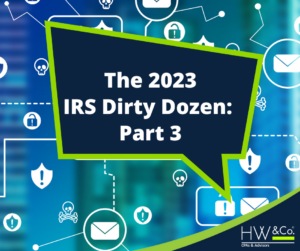 Last week, we introduced you to the IRS’s 2023 Dirty Dozen campaign, an annual list compiled by the IRS noting the most common tax schemes. The campaign provides taxpayers with important information about how to protect themselves against con artists attempting steal their information or defraud them.
Last week, we introduced you to the IRS’s 2023 Dirty Dozen campaign, an annual list compiled by the IRS noting the most common tax schemes. The campaign provides taxpayers with important information about how to protect themselves against con artists attempting steal their information or defraud them.
Today, we’ll look at three more topics related to nefarious scams: improper fuel tax credit claims, fake charities, and dishonest tax professionals.
4. False Fuel Tax Credit Claims
The IRS is warning that some conniving third parties may attempt to convince unwitting taxpayers to apply for fuel credits – luring them with the promise of a significant refund even though they are not eligible. These scammers take advantage of the taxpayers by charging fees or stealing their personal information.
“People should watch out for erroneous fuel tax credit claims and the scammers that promote them,” said IRS Commissioner Danny Werfel. “These scammers will often charge a hefty fee for these bogus claims, and participants also face the possibility of identity theft. This is another example that people should always remember: Be wary if a tax deal sounds too good to be true.”
Because the tax credit is limited to off-highway business use (applicable for companies such as those operating in landscaping, farming, manufacturing, etc.), the typical taxpayer is not eligible. But taxpayers sometimes falsely claim the credit to bolster their refunds, often convinced to do so by devious promoters looking to take advantage. As such, the IRS has increased its screening measures around the fuel tax credit claims in order to identify and stop the fraud. Taxpayers who falsely claim credits can be subject to fines and prosecution, so it’s important to be honest.
5. Fake Charities Exploiting Taxpayers
Scammers are increasingly setting up fake charities to take advantage of generous taxpayers, especially following disasters. The IRS cautions taxpayers to do their homework when donating to charities, and to validate that their funds are going to a legitimate organization. According to Commissioner Werfel, phone scams requesting monetary donations for charitable causes are common. Taxpayers should also watch out for emails and texts requesting money for aid. These methods are often used by fraudsters to steal both money and sensitive personal information. By giving to recognized, well-known charities, taxpayers can avoid getting pulled into scams.
Keep in mind, giving to a charity can allow you to claim a deduction on your tax return, but your donation must go to a tax-exempt organization recognized by the IRS in order to qualify. This is a great checkpoint for ensuring that your gift is going to a credible organization.
6. Deceitful Tax Professionals
Most tax preparers are trustworthy professionals who want to provide a valuable service and build a long-term relationship with their clients. Unfortunately, because of the nature of the profession, some scammers may try to profit off taxpayers who haven’t done their due diligence when selecting their tax preparer.
Dishonest tax preparers profit from their victims in a variety of ways, but there are usually warning signs. Some key indicators that a preparer might not have the best intentions include:
- Asking for cash only payments and not providing receipts for those payments
- Falsifying income records to increase tax credits
- Falsely claiming deductions to increase refunds
- Sending refunds directly to the preparer’s bank account rather than to the taxpayer’s bank account
Red flags also include preparers who charge their fees based on the size of refunds, as well as those who won’t sign tax returns or request that taxpayers sign blank returns. The IRS has a Directory of Federal Tax Return Preparers with Credentials and Select Qualifications, which taxpayers can use to find a qualified tax professional or verify their credentials.
The IRS urges people to report abusive tax schemes and abusive tax return preparers.
Read more about the other entries in the IRS’s Dirty Dozen campaign:
IRS Dirty Dozen Part 1 – 2023 Campaign Kicks Off by Warning About ERC Schemes
IRS Dirty Dozen Part 2 – Phishing, Smishing, and Fake Assistance with Online Accounts
IRS Dirty Dozen Part 4 – Advice on Social Media, Spearphishing, and OIC Mills
IRS Dirty Dozen Part 5 – Schemes Aimed at High-Income Tax Filers, Bogus Tax Avoidance Strategies, and Schemes With International Elements
Stay tuned over the coming weeks as we continue to profile the remaining entries to keep you apprised of how to avoid evolving tax schemes.
For more information, please visit the IRS website or contact an HW&Co. Advisor today.
@2023



